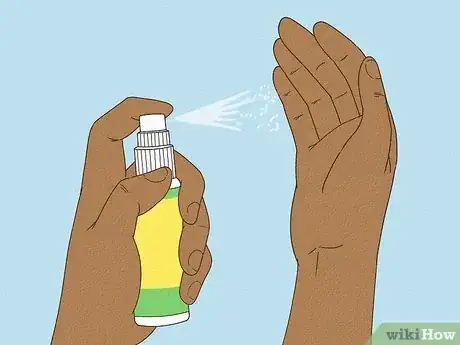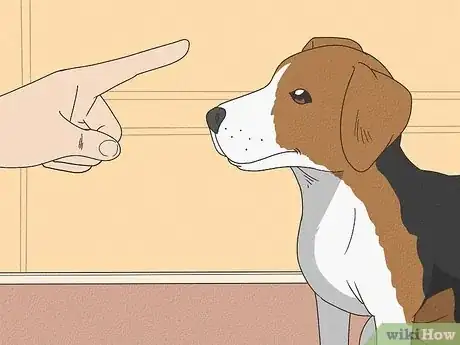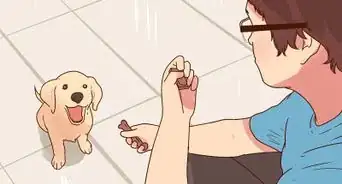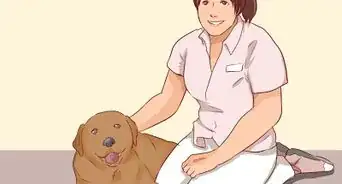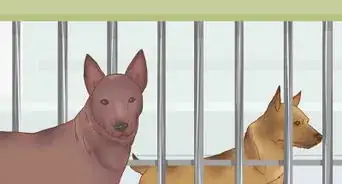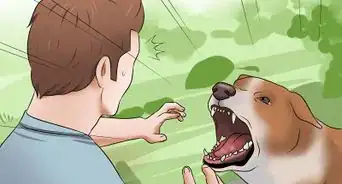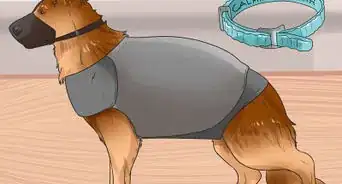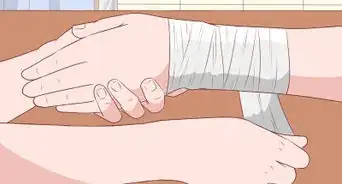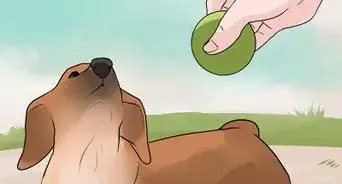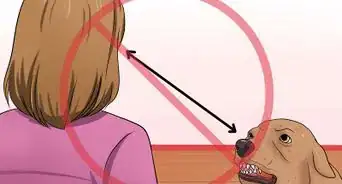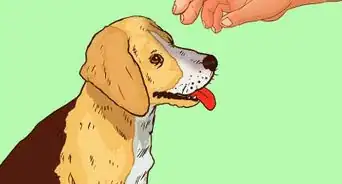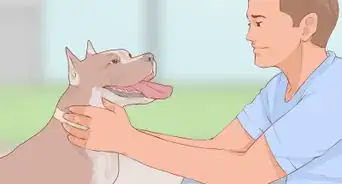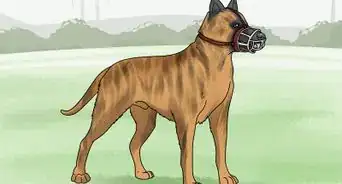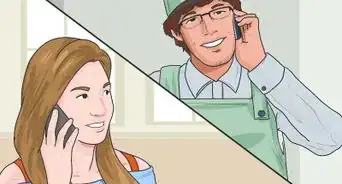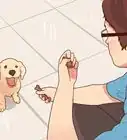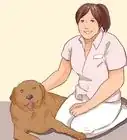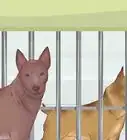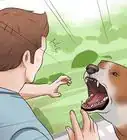This article was co-authored by David Levin and by wikiHow staff writer, Aly Rusciano. David Levin is the Owner of Citizen Hound, a professional dog walking business based in the San Francisco Bay Area. With over 9 years of professional dog walking and training experience, David's business has been voted the "Best Dog Walker SF" by Beast of the Bay for 2019, 2018, and 2017. Citizen Hound has also been ranked #1 Dog Walker by the SF Examiner and A-List in 2017, 2016, 2015. Citizen Hound prides themselves on their customer service, care, skill, and reputation.
There are 8 references cited in this article, which can be found at the bottom of the page.
wikiHow marks an article as reader-approved once it receives enough positive feedback. This article received 23 testimonials and 80% of readers who voted found it helpful, earning it our reader-approved status.
This article has been viewed 1,294,572 times.
Your puppy is oh-so-adorable, but boy, can they bite! Enough is enough, and it’s time to nip this nipping habit in the bud—but how do you do that? Luckily, puppies are incredibly smart, and with a few simple training techniques and positive reinforcement, you’ll be kissing their biting habits goodbye. Ready to finally stop your pup from biting too hard during play or chewing up your favorite slippers? Read through our complete guide below.
Things You Should Know
- Keep your puppy occupied with teething toys designed for chewing to satisfy their need to bite.
- Use verbal cues like “Ouch!” or “No” to teach your pup that biting is a big no-no.
- Introduce your pup to other dogs to help them learn the consequences of biting naturally.
Steps
Expert Q&A
Did you know you can get expert answers for this article?
Unlock expert answers by supporting wikiHow
-
QuestionDo puppies grow out of biting?
 David LevinDavid Levin is the Owner of Citizen Hound, a professional dog walking business based in the San Francisco Bay Area. With over 9 years of professional dog walking and training experience, David's business has been voted the "Best Dog Walker SF" by Beast of the Bay for 2019, 2018, and 2017. Citizen Hound has also been ranked #1 Dog Walker by the SF Examiner and A-List in 2017, 2016, 2015. Citizen Hound prides themselves on their customer service, care, skill, and reputation.
David LevinDavid Levin is the Owner of Citizen Hound, a professional dog walking business based in the San Francisco Bay Area. With over 9 years of professional dog walking and training experience, David's business has been voted the "Best Dog Walker SF" by Beast of the Bay for 2019, 2018, and 2017. Citizen Hound has also been ranked #1 Dog Walker by the SF Examiner and A-List in 2017, 2016, 2015. Citizen Hound prides themselves on their customer service, care, skill, and reputation.
Professional Dog Trainer Your puppy can grow out of biting if you teach it to. Dogs learn best when we show them what to do instead of what not to do. For instance, try smoothing a little peanut butter on the back of your hand. Present it to the dog, and if they lick instead of using their teeth, mark that as correct with a clicker or a verbal indicator, then give them a treat. Once that's consistent, remove the peanut butter and treat for licking, then put a verbal word to the action, like "kisses." Now you have something the dog can do instead of biting.
Your puppy can grow out of biting if you teach it to. Dogs learn best when we show them what to do instead of what not to do. For instance, try smoothing a little peanut butter on the back of your hand. Present it to the dog, and if they lick instead of using their teeth, mark that as correct with a clicker or a verbal indicator, then give them a treat. Once that's consistent, remove the peanut butter and treat for licking, then put a verbal word to the action, like "kisses." Now you have something the dog can do instead of biting. -
QuestionHow do you get your puppy to stop biting?
 David LevinDavid Levin is the Owner of Citizen Hound, a professional dog walking business based in the San Francisco Bay Area. With over 9 years of professional dog walking and training experience, David's business has been voted the "Best Dog Walker SF" by Beast of the Bay for 2019, 2018, and 2017. Citizen Hound has also been ranked #1 Dog Walker by the SF Examiner and A-List in 2017, 2016, 2015. Citizen Hound prides themselves on their customer service, care, skill, and reputation.
David LevinDavid Levin is the Owner of Citizen Hound, a professional dog walking business based in the San Francisco Bay Area. With over 9 years of professional dog walking and training experience, David's business has been voted the "Best Dog Walker SF" by Beast of the Bay for 2019, 2018, and 2017. Citizen Hound has also been ranked #1 Dog Walker by the SF Examiner and A-List in 2017, 2016, 2015. Citizen Hound prides themselves on their customer service, care, skill, and reputation.
Professional Dog Trainer Use your attention as a training tool. The most basic way to reward your puppy for not biting is simply by allowing them to continue to play with you. Conversely, you can punish a puppy that's taking things too far by removing access to you as a playmate. Communicate these limits through your body language, energy, and verbal communication. This will mimic the natural way puppies would be ostracized if they played too rough within their litter.
Use your attention as a training tool. The most basic way to reward your puppy for not biting is simply by allowing them to continue to play with you. Conversely, you can punish a puppy that's taking things too far by removing access to you as a playmate. Communicate these limits through your body language, energy, and verbal communication. This will mimic the natural way puppies would be ostracized if they played too rough within their litter. -
QuestionOur 18 week old Sprocker bites my wife and son, but not me or our older son. We've tried stuff from the internet and training classes, with not luck. What can we do?
 Pippa Elliott, MRCVSDr. Elliott, BVMS, MRCVS is a veterinarian with over 30 years of experience in veterinary surgery and companion animal practice. She graduated from the University of Glasgow in 1987 with a degree in veterinary medicine and surgery. She has worked at the same animal clinic in her hometown for over 20 years.
Pippa Elliott, MRCVSDr. Elliott, BVMS, MRCVS is a veterinarian with over 30 years of experience in veterinary surgery and companion animal practice. She graduated from the University of Glasgow in 1987 with a degree in veterinary medicine and surgery. She has worked at the same animal clinic in her hometown for over 20 years.
Veterinarian It sounds like your wife and son are regarded differently by the dog. You need to figure out what it is that's being done differently, and then correct this. For example, do your wife or son squeal when the dog mouths them (which makes them sound like squeaky toys and is very exciting to the Sprocker). Do you and the older son have deep voices and are firmer with the pup? Who walks the dog? Who feeds the dog? You need a root and branch review of the management of the dog so that everyone plays an equal part and is equally respected by the dog.
It sounds like your wife and son are regarded differently by the dog. You need to figure out what it is that's being done differently, and then correct this. For example, do your wife or son squeal when the dog mouths them (which makes them sound like squeaky toys and is very exciting to the Sprocker). Do you and the older son have deep voices and are firmer with the pup? Who walks the dog? Who feeds the dog? You need a root and branch review of the management of the dog so that everyone plays an equal part and is equally respected by the dog.
Warnings
- If you or your loved ones are frightened by a biting pup after trying multiple biting inhibition techniques, reach out to a veterinarian or certified dog trainer for help.⧼thumbs_response⧽
References
- ↑ https://www.humanesociety.org/resources/stop-your-dogs-chewing
- ↑ https://www.oregonhumane.org/training/teaching-bite-inhibition-and-dealing-with-rough-puppy-play/
- ↑ https://anticruelty.org/pet-library/puppy-nipping
- ↑ https://www.humanesociety.org/resources/stop-your-dogs-chewing
- ↑ https://edmontonanimalrescue.org/blog/my-puppy-wont-stop-biting-me
- ↑ https://www.humanesociety.org/resources/stop-your-dogs-chewing
- ↑ https://spcaswiftcurrent.com/tips-articles/bite-inhibition-an-essential-part-of-socialization/
- ↑ https://www.thinkingoutsidethecage.org/pet-resources/behavior-help/dog-behavior-help/time-outs-2/
- ↑ https://youtu.be/068K5Zlph9U?t=257
About This Article
Puppies, especially ones under 6 months old, bite things a lot because they're teething. While you can't stop a puppy from biting completely, you can train it not to bite too hard and to focus its biting on chew toys. Whenever your puppy bites down hard enough to hurt you, yell "Ouch!" or "That hurt!" so it knows you're in pain. Then, pull away and ignore your puppy for a few minutes. Over time, your puppy will learn that biting too hard can hurt people and that it won't get your attention if it keeps doing it. If your puppy is biting on something it's not supposed to, like your hand or your shoes, try redirecting its attention to a chew toy instead. Put the toy in its mouth and move it around to make it seem fun and exciting. If your puppy plays with the chew toy, give it a treat to reinforce the good behavior. Eventually, your puppy will learn that it gets rewards and attention when it chews on toys, and it should stop biting people and objects around the house as much. To learn more from our Veterinarian co-author, like how to use a muzzle if your puppy keeps biting, keep reading the article!


